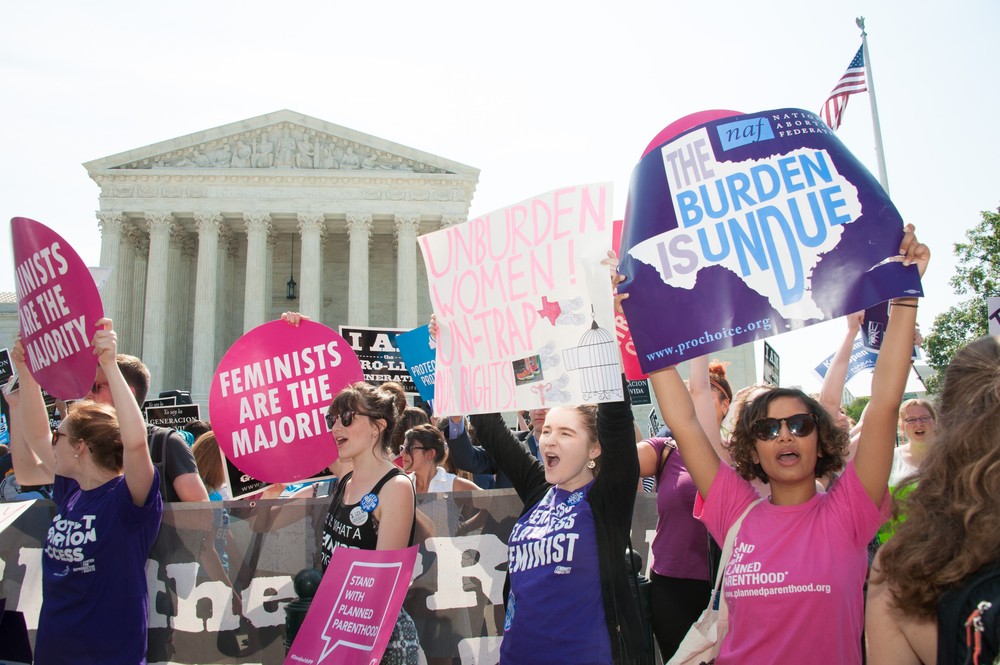Blog Post
Are pro-lifers on the cusp of winning the American abortion wars?
By Jonathon Van Maren
If David French is right, abortion politics in America are taking an unexpected turn. In one of his recent newsletters from The Dispatch, he theorizes that the Virginia race highlights the fact that abortion is not as much of an animating factor for either side—but notes that this could be because even pro-choice Americans do not view abortion as a “desirable good.” Despite the fact that abortion is more politically relevant now than at any point since 1992 (Planned Parenthood v. Casey), with the Supreme Court hearing arguments on the Texas Heartbeat Act and preparing to hear the case that could be the catalyst for overturning Roe, voters largely ignored abortion as the primary issue of the campaign.
As I noted earlier, Democrat Terry McAuliffe certainly didn’t. He believed what Democrats and abortion activists have been saying for months—that there will be a brutal voter backlash to the wave of pro-life laws passing across America. Three of his most expensive and prominent ads were on abortion; each aired more than 1,100 times. He campaigned in front of an abortion clinic, and the New York Times, NPR, the Washington Post, and other media outlets stated that the gubernatorial race would tell us much about “the new politics of abortion.”
Pro-lifers can be disappointed that a mere 8% of Virginian voters said abortion was their top issue (although Virginia is a typically Democratic state); those counting on an abortion backlash should be deeply concerned by the fact that 58% of those voters went Republican. French notes that this should not shock anyone; despite online intensity about abortion, Evangelical and Republican support for politicians is driven far more by issues such as immigration and the economy. A majority of Evangelicals in Virginia did not list abortion as their top issue. Again, this is not surprising considering the fact that the previous governor of Virginia was Ralph Northam.
But here is where it gets particularly interesting. From David French:
But if pro-life Evangelicals weren’t prioritizing abortion, then pro-choice voters were prioritizing it even less. Voters focused on protecting abortion rights were the minority of a small minority. They were 41 percent of the eight percent. McAuliffe’s giant ad buys represented a tremendous swing and miss. He made the argument. Pro-choice Virginians simply didn’t respond.
Why the indifference? In a smart post, McCormack rightly argues “what happens in one state won’t have much of an impact on how voters vote in other states.” In other words, Texas isn’t Virginia, and Virginia voters rightly care less about Texas. Also, Youngkin didn’t stake out an abolitionist position on abortion during the race. He identifies as pro-life and supports additional abortion restrictions under Virginia law, but he has stopped short of pledging an abortion ban.
At the same time, however, I do wonder if something much deeper is going on—something that isn’t directly related to politics, but rather to the two powerful cultural realities in the United States that I’ve identified time and again. Abortion rates and ratios have declined dramatically, and even abortion supporters tend not to believe abortion is a “desirable good.”
With apologies to longtime readers, it’s worth reviewing the facts. In my experience, few Americans understand how dramatically abortion rates have declined since their highs in the early 1980s. According to data from the pro-choice Guttmacher Institute, the abortion rate (abortions per 1,000 women) is below the rate when Roe was decided, and when Roe was decided abortion was illegal or sharply restricted in most states.
If you think the abortion rate decline is entirely the product of a decreasing American birth rates, think again. Not only has the abortion rate declined, so has the ratio (abortions per 1,000 pregnancies), and so has the absolute number of abortions performed per year.
In 2017 (there tends to be rather substantial lag time in abortion rate reporting), there were 13.5 abortions per 1,000 women. That’s well less than half the peak, and it represents the continuation of declines that have occurred in every American presidency since Carter’s, regardless of whether the president was pro-life or pro-choice.
The reasons for the decline are varied and complex—and contraception plays a big role in the story—but it’s also true that even abortion rights supporters have mixed feelings about the practice itself. The best single study I’ve ever read about American attitudes towards abortion comes from Tricia Bruce at Notre Dame.
Abortion can be notoriously hard to poll, with answers highly dependent on question phrasing and citizen knowledge. How many respondents truly understand that overruling Roe won’t ban abortion nationally, but rather leave the issue for states—or potentially Congress—to resolve?
Bruce took a different approach. She and her team conducted 217 in-depth interviews of a demographically-representative cross-section of Americans. The interviews lasted an average of 75 minutes, and the questions were designed to “elicit thoughts, feelings, and experiences connected to abortion attitudes.”
The responses were fascinating, and I’ve written about them repeatedly. They provide an in-depth understanding of the nuances of American thoughts, and it should be required reading for advocates on both sides of the pro-life/pro-choice divide. But of all the findings, this stands out:
None of the Americans we interviewed talked about abortion as a desirable good. Views range in terms of abortion’s preferred availability, justification, or need, but Americans do not uphold abortion as a happy event, or something they want more of. From restrictive to ambivalent to permissive, we instead heard about the desire to prevent, reduce, and eliminate potentially difficult or unexpected circumstances that predicate abortion decisions (whether of relationships, failed contraception, lack of education, financial hardship, or the like). Even those most supportive of abortion’s legality nonetheless talk about it as “hard,” “serious,” not “happy,” or benign at best. (Emphasis added.)
In fact, the first sentence is entirely consistent with what I hear from thoughtful pro-choice advocates all the time. They seek to preserve abortion rights not because people are “happy” to have abortions, but rather because they feel an abortion is a sad necessity, or prudent but hard.
But let’s combine the abortion data with attitudes about abortion itself. The reality is that fewer and fewer American women are availing themselves of a procedure that virtually none of them affirmatively like. That is not generally a recipe for real-world political intensity. It means abortion is increasingly out of sight (alien to personal experience) and out of mind (unpleasant to think about).
Consider a counter-factual. Would fights over free speech, religious freedom, or gun rights be more or less intense if, in any given year, (a) few people exercised those rights, and (b) those who exercised their rights considered that exercise “hard” or “serious” and definitely not a “desirable good”?
Most people who prioritize the defense of free speech, religious freedom, or the Second Amendment both value the right and often relish its exercise. They find meaning and purpose in vocalizing their ideas, living their faith, or protecting their families.
It’s impossible to know if the (relative) public indifference to the abortion debate will impact the Supreme Court. Even if it does impact the Court, it’s anybody’s guess as to the direction of that impact. My friend John McCormack argues that the Virginia results provide evidence “that if the Supreme Court does restore the right of the American people to enact laws protecting the lives of unborn babies, there would not be some sort of overwhelming nationwide backlash against Republicans at the polls in 2022.”
He’s likely right, especially if the pandemic, inflation, and supply chain issues remain relevant in the public debate. In fact, it’s been fascinating to watch the real-world response to Texas’s SB 8. While Twitter arguments rage and courtroom battles continue, the issue has seemed to trigger less cultural conversation than the controversies over Dave Chapelle’s Netflix comedy, and corporate activism has been muted.
The abortion rate continues to wane, and if negative attitudes about abortion persist, could the abortion debate end not with a giant legal and political bang—with huge numbers of Americans rallying for or against abortion rights and placing abortion at the center of American political life—but with an exhausted cultural whimper?
Outside of politics, Americans are making choices, and the direction of those choices is clear. American pregnancies are increasingly rare, and they are increasingly precious. There are many consequences to this significant cultural shift, but we might see one consequence already: The abortion debate is changing, and the intensity of the argument may not be as high as either side expects. In Virginia—with Roe in the crosshairs—voters responded with a yawn, not a roar.
One of the things that makes America different from other nations is that decades of work by the pro-life movement has ensured that abortion is not considered healthcare. Nearly a half-century after abortion was legalized in all fifty states, abortion is still considered a fundamentally moral issue, despite all attempts by activists to portray abortion as necessary, as “good,” or as a procedure as morally uncomplicated as an appendectomy. Americans on both sides of the debate understand abortion in moral terms like the citizens of no other Western nation, and that is because millions of pro-lifers have refused to allow America to forget that fundamental fact.
I hope David French is right. He is more of an optimist than I am, and his determination to be a contrarian moderate means his optimism can frequently be misplaced. But an America where the Supreme Court sends abortion back to the states and allows activists to focus on state governments and local ordinances would be a much better place. Americans could choose if they wanted to live in states governed by pro-life laws or not. Politicians could pass laws that would actually take effect—and would have to actually defend the laws they passed. Real progress could finally be made.
Perhaps we are on the cusp of seeing this start to unfold.








